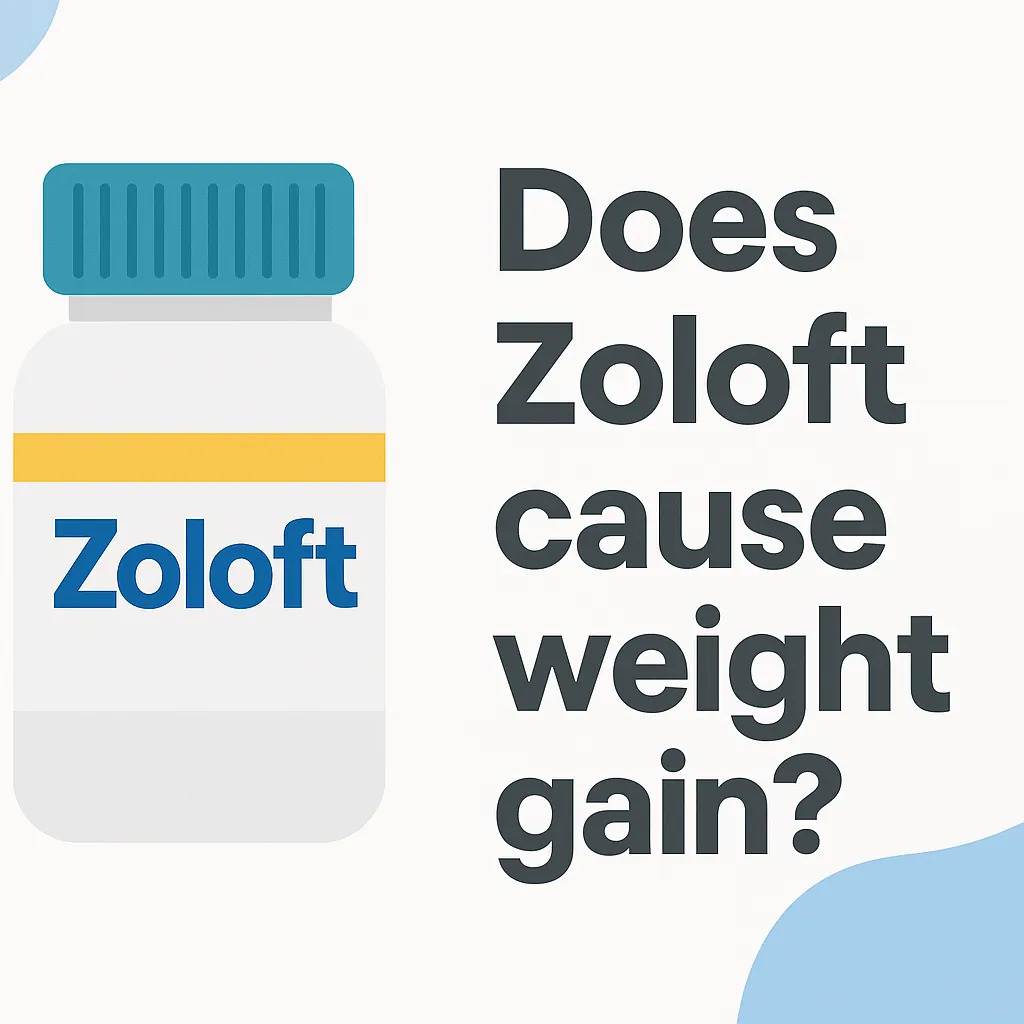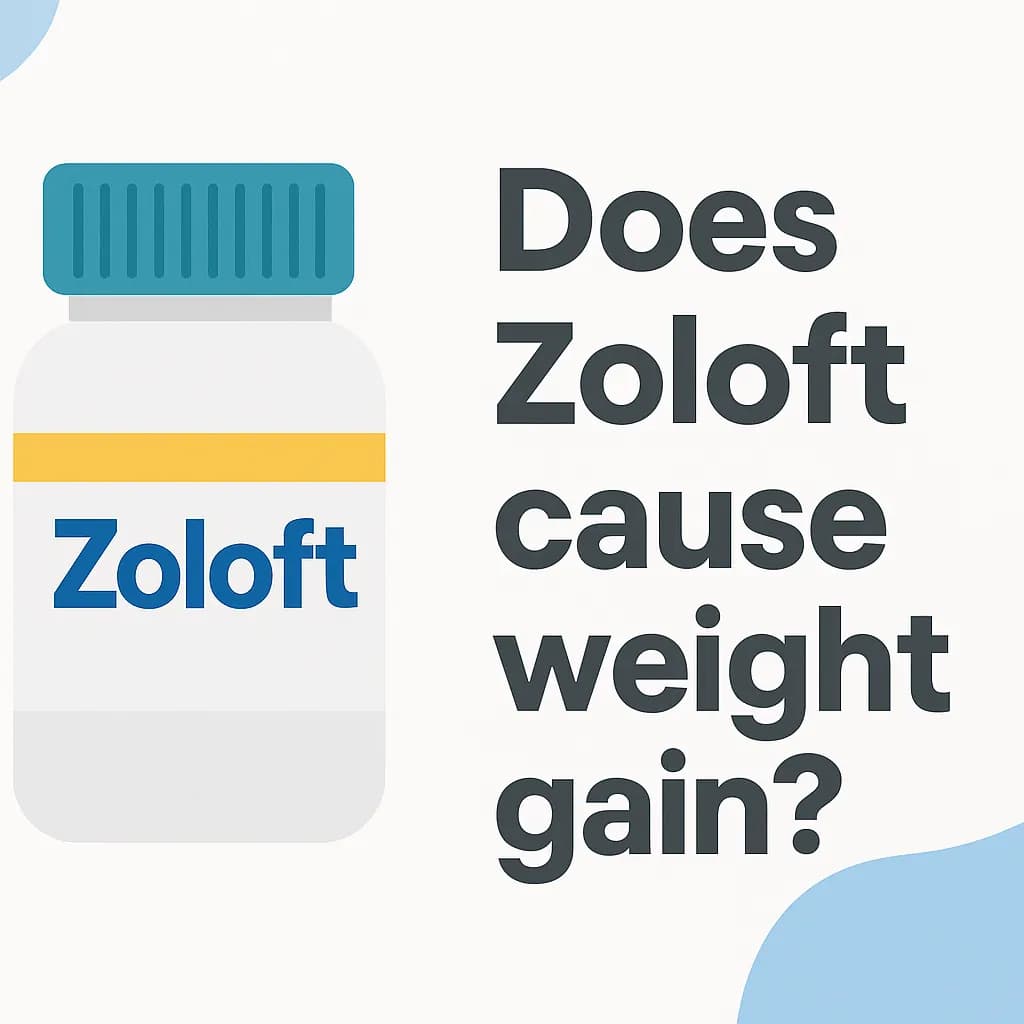Does Zoloft cause weight gain?

Zoloft (sertraline) is a brand-name medication that belongs to the selective serotonin reuptake inhibitor (SSRI) class of antidepressants. It works by increasing the levels of serotonin in your brain. Serotonin is a neurotransmitter that plays a role in your mood, memory, sleep, and appetite, among other things.
Zoloft is often prescribed to treat symptoms of depression (major depressive disorder) or other mental health conditions such as:
- Obsessive-compulsive disorder (OCD)
- Social anxiety disorder (SAD)
- Post-traumatic stress disorder (PTSD)
- Panic disorder (PD)
- Premenstrual dysphoric disorder (PMDD)
As with all medications, Zoloft may cause side effects. Some of the most common include nausea, diarrhea, drowsiness, dry mouth, and trouble sleeping. While weight gain was not listed as a side effect from their initial clinical trials, studies have shown that people using SSRIs such as Zoloft can have an increase in body weight when taking these medications.
A 2000 study, which looked at people who took an SSRI for up to 32 weeks found Zoloft to cause a weight gain of 1%. And 4.2% of those taking Zoloft gained more than 7% of their body weight.
A 2016 clinical study looked at weight gain in adults after 2 years of taking an antidepressant medication. In this study, people who took Zoloft gained an average of 5.9 pounds after 2 years.
Another recent study found that Zoloft was associated with an average gain of nearly 0.5 pounds at 6 months. That rose to 3.2 pounds at 24 months.
How does this compare to other SSRIs and antidepressant drugs?
- Lexapro: 1.4 pounds at 6 months, 3.6 pounds at 24 months
- Paxil: 1.4 pounds at 6 months, almost 3 pounds at 24 months
- Cymbalta: 1.2 pounds at 6 months, 1.7 pounds at 24 months
- Wellbutrin users were 15% less likely to gain weight compared to Zoloft
- Prozac use was not associated with a weight change
Zoloft FAQs
What are the side effects of Zoloft?
The most common side effects of Zoloft include:
- Nausea
- Diarrhea
- Trouble sleeping
- Dry mouth
- Indigestion
- Tiredness or drowsiness
Other less serious potential side effects include:
- Irregular heartbeat
- Loss of appetite
- Changes in vision
- Tremor
- Sexual problems
- Sweating
Rare but serious side effects include:
Shop Medications
- Serious allergic reactions
- Worsening depression and suicidal thoughts
- Serotonin syndrome
- Increased risk of bleeding
- Glaucoma
- Abnormal heart rhythm
- Low blood sodium levels
In children and adolescents, side effects may include:
- Increased muscle movement
- Agitation
- Nose bleeds
- Urinary incontinence
- Aggression
- Slowed growth rate
- Weight gain or weight loss
These are not all of the possible side effects of Zoloft. Contact your healthcare provider for advice. Report side effects to the FDA at 1-800-FDA-1088 or www.fda.gov/medwatch.
Are there drug interactions with Zoloft?
Ask your healthcare provider if your medications or supplements interact with Zoloft. These include:
- Other SSRIs
- SNRIs
- MAOIs
- Tricyclic antidepressants
- Triptans
- Opioids
- Tryptophan
- St. John’s Wort
- Amphetamines
- Lithium
- Buspirone
- NSAIDs
- Aspirin
- Anticoagulants
- QT-prolonging drugs
- Seizure medications
- Drowsiness-causing substances
- Antabuse (with oral solution)
Who should not take Zoloft?
- If taking or recently took an MAOI
- If taking Orap (pimozide)
- If allergic to sertraline or ingredients in Zoloft
- If taking Antabuse with oral solution
What does your healthcare provider need to know before you start Zoloft?
- Liver, heart, or kidney problems
- History of seizures or convulsions
- Bipolar disorder or mania
- Low blood sodium levels
- History of stroke
- High blood pressure
- History of bleeding problems
- If pregnant or planning pregnancy
- If breastfeeding
How can you avoid gaining weight on Zoloft?
- Eat a healthy diet with fruits, vegetables, lean proteins, and whole grains
- Exercise regularly with at least 150 minutes of activity weekly
- Get 7–9 hours of sleep per night
- Talk to your provider about switching medications if needed
Related Medications
- Prozac (fluoxetine)
- Paxil (paroxetine)
- Celexa (citalopram)
- Pristiq (desvenlafaxine)
- Effexor XR (venlafaxine ER)
- Remeron (mirtazapine)
Sources
- Gafoor R, et al. BMJ. 2018. Accessed July 10, 2024.
- Arterburn D, et al. J Clin Med. 2016. Accessed July 10, 2024.
- Blumenthal SR, et al. JAMA Psychiatry. 2014. Accessed July 10, 2024.
- CDC. Physical Activity for Adults. Accessed July 10, 2024.
- Kline CE, et al. Int J Obes. 2021. Accessed July 10, 2024.
- Zoloft Product Information. FDA. Accessed July 10, 2024.








